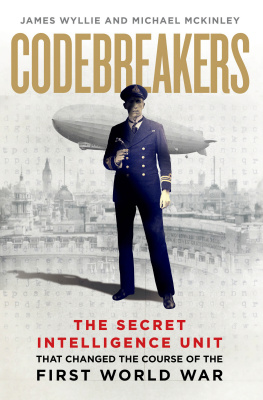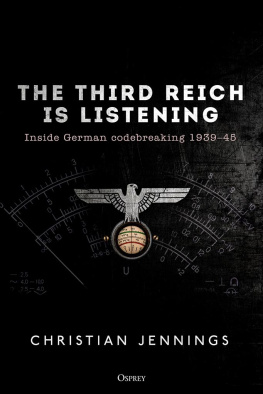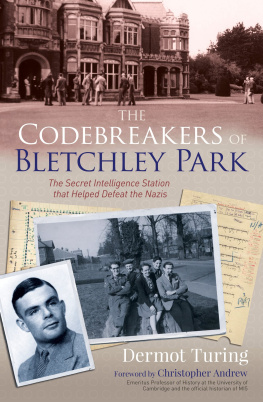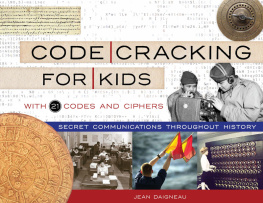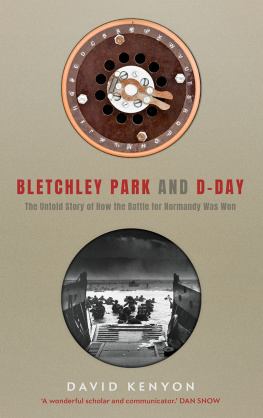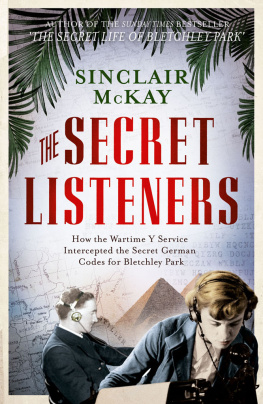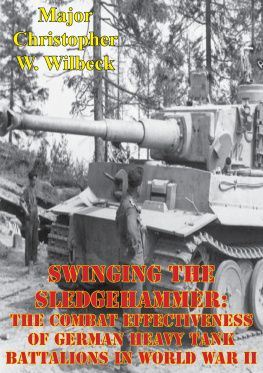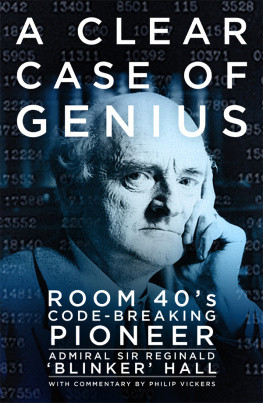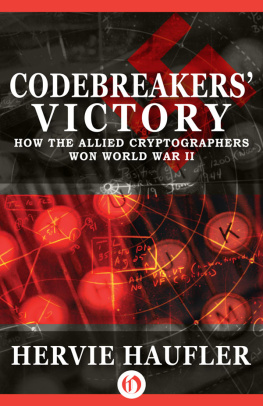CONTENTS
About the Book
While battalions hunkered down in the mud of western France, anti-aircraft guns took aim at zeppelins floating over the capital and Atlantic convoys tried desperately to evade German U-boats, another, more secret battle was underway. A team of codebreakers was fighting for information that would give them a crucial advantage over the enemy.
The new inventions of wireless and telegraph were key to winning the war but vulnerable to interception. In London, Room 40, led by the charismatic and cunning Blinker Hall, was at the forefront of cracking the codes used to protect them. Rather than wait for intelligence to come to him, Hall was soon running agents in other countries and exploiting every opportunity to get the upper hand.
From violence and subterfuge on the docks of New York City to shady deals in Madrid cafs, this is the gripping true story of spies, codebreakers and saboteurs.
About the Authors
JAMES WYLLIE is an author, award-winning screenwriter and broadcaster. He published Goering and Goering: Hitlers Henchman and His Anti-Nazi Brother in 2010 and has worked on numerous films for the BBC, Film4 and Talkback. He has written for a number of TV drama series including The Bill, The Tribe and Atlantis High.
MICHAEL MCKINLEY is an award-winning author, filmmaker, journalist and screenwriter. Based in New York, he has written for the New York Observer, the New York Daily News and the Chicago Sun-Times. He is the author of a number of books and has made documentaries for CNN, The Discovery Channel and CBC.

This ebook is copyright material and must not be copied, reproduced, transferred, distributed, leased, licensed or publicly performed or used in any way except as specifically permitted in writing by the publishers, as allowed under the terms and conditions under which it was purchased or as strictly permitted by applicable copyright law. Any unauthorized distribution or use of this text may be a direct infringement of the authors and publishers rights and those responsible may be liable in law accordingly.
Version 1.0
Epub ISBN 9781473501461
www.randomhouse.co.uk
1 3 5 7 9 10 8 6 4 2
Ebury Press, an imprint of Ebury Publishing
20 Vauxhall Bridge Road
London SW1V 2SA
Ebury Press is part of the Penguin Random House group of companies whose addresses can be found at global.penguinrandomhouse.com

Copyright James Wyllie and Michael McKinley 2015
James Wyllie and Michael McKinley have asserted their right to be identified as the authors of this Work in accordance with the Copyright, Designs and Patents Act 1988
The authors have made every effort to contact and acknowledge the copyright holders of all images printed within and, if notified, will correct any omission in future editions
First published by Ebury Press in 2015
www.eburypublishing.co.uk
A CIP catalogue record for this book is available from the British Library
ISBN 9780091957728
Introduction
INFORMATION WAR
1916: The war that began in August 1914, and was meant to be over by Christmas, has become truly global. A famous author, now a British spy, sits at a street caf in Spain telling a local police officer about the imminent arrival of a German submarine carrying biological weapons. On the mud-caked battlefield of the Somme, an artillery officer is training his guns on the Germans own artillery, hoping that by smashing them hell save the lives of thousands of his countrymen. In the hostile waters of the North Sea, an admiral guides the British fleet towards a titanic confrontation with the enemys battleships. Surrounded by the seemingly limitless deserts of Mesopotamia, a general contemplates the best way to outmanoeuvre Turkish forces en route to Baghdad. Across the Atlantic, a tough New York cop is trying to uncover plots to destroy US factories. And as night descends on London, volunteers rush to man searchlights that will seek out Zeppelin raiders as they attempt to bomb the capital.
Each of these individuals was linked by a common thread: whether huddled together in nondescript rooms in Whitehall, hunkered down in makeshift accommodation close to the killing zones of the Western Front, or meeting in luxury hotels in Cairo, they were all acting on information supplied by codebreakers.
The codebreakers exerted a huge influence on the outcome of the First World War. Their achievements were the result of three interlocking factors: the genius of the codebreakers themselves; the emergence of the modern security state; and the recent revolution in communications technology the wireless and the telegraph that would usher in the first Age of Information.
They were an eccentric bunch, recruited mostly from academia linguists and classicists were highly prized but they also included writers, artists, theatre folk, crossword fanatics, retired military men and those who mixed in the same elevated social circles. Trained on the job, with no precedents to guide them, they were dedicated, tireless and determined to prove their worth, which they did time and time again.
As a result, Signals Intelligence the interception and decoding of messages established itself as the most potent branch of the emerging espionage agencies that had come into being in the years preceding the First World War.
The business of spying was still at a rudimentary stage in 1914. Over the next four years, the espionage community expanded hugely to try and cope with the demands of total war. Agent networks were established, tradecraft was perfected, and the collection of information was thoroughly compartmentalised. Human intelligence contributed to a number of very successful operations; however, overall, its impact on the war was negligible. If anything, the reputation of the burgeoning security services rested on the codebreakers achievements and the intelligence supplied by them.
Of course, without material to work on, the codebreakers would have been irrelevant. New modes of communication, particularly the wireless, would provide them with hundreds and hundreds of messages. All the Great Powers were quick to take an interest in radio as a means of revolutionising their military communications. However, wireless had an Achilles heel: while messages could be transmitted and received, they could also be intercepted, the signals plucked out of the air. The advantages wireless offered were therefore offset by the fact that it was a fundamentally insecure medium for broadcasting sensitive information and in war all information is sensitive.
This left the belligerents with no alternative but to encode their messages, which is where the codebreakers came in. Over the course of the war, all the combatants set up codebreaking organisations and they all achieved notable successes. The French were extremely effective on the Western Front; the Germans cracked Allied naval and army codes; the Austro-Hungarians broke the Russian codes and vice versa; even the Americans, latecomers to the conflict, established their own Black Chamber of cryptanalysts. However, none of them matched the sheer scale, scope and diversity of the British cryptographic effort. Overall, Britains codebreakers achieved the most significant and wide-ranging results, ultimately changing the course of the war.

